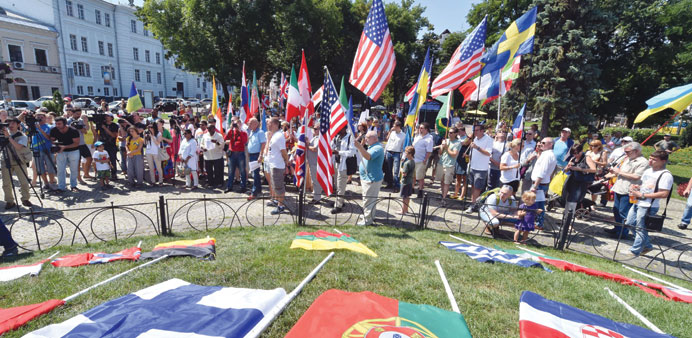Foreign citizens working and living in Ukraine wave the flags of their countries during a rally yesterday demanding justice for the victims of the downed Malaysia Airlines Flight MH17, at Independence Square in Kiev.
AFP
Dutch authorities probing the downing of Malaysian flight MH17 said yesterday that it was “unrealistic” to send armed troops to secure the crash site, after 13 people including two children were killed in fierce fighting in insurgent-held east Ukraine.
The Netherlands and Australia had planned to send armed officers to ensure that investigators are able to carry out their work at the vast crash site. But Dutch Prime Minister Mark Rutte now said this is no longer viable.
“Getting the military upper hand for an international mission in this area is according to our conclusion not realistic,” Rutte told journalists in The Hague, noting the presence of heavily armed separatists and the proximity of the border with Russia – accused of backing the rebels.
Even an unarmed team of Dutch and Australian officers was forced to drop their plans to visit the site yesterday as heavy bombardments rocked towns close to the site, where some remains of the 298 victims from the plane still lie decomposing under the summer sun.
Rutte said that “all options” were being looked at for securing the site, and that the security situation was being assessed on a daily basis.
The unarmed contingent of law enforcers was due at the location 10 days after the disaster, following a deal with rebels that sought to enable a long-delayed probe.
More than 200 bodies have been sent to the Netherlands for identification. The Netherlands lost 193 citizens on the flight, and is in charge of the crash investigation.
“We concluded with our international partners that there’s a real risk of such an international military mission becoming directly involved in the conflict in Ukraine,” Rutte said.
The conflict “would then acquire an international dimension that would lead to further escalation”, added the premier.
“So the success of the repatriation mission depends on preventing an escalation in this area. The less potential the mission has for escalation, the more quickly we will be able to complete our task,” he said.
“There is fighting going on. We can’t take the risk,” said Alexander Hug, deputy chief monitor of the European security body OSCE’s special mission in Ukraine.
“The security situation on the way to the site and on the site itself is unacceptable for our unarmed observer mission,” he told reporters in the insurgent stronghold Donetsk, the biggest city in the region.
An AFP photographer heard artillery bombardments just a kilometre (half a mile) from the rebel-held town of Hrabove (also spelled Grabove), next to the crash site, and saw black smoke billowing into the sky.
Terrified local residents were fleeing and checkpoints controlled by separatist fighters were abandoned.
Earlier, Australian Prime Minister Tony Abbott had said 49 officers from the Netherlands and Australia – which together lost some 221 citizens in the crash – were due at the scene and that there would be “considerably more on site in coming days”.
That came after Malaysian Prime Minister Najib Razak said he had reached an agreement with the pro-Russian insurgents controlling the site to allow the police deployment.
“I hope that this agreement ... will ensure security on the ground, so the international investigators can conduct their work,” Razak said, adding that 68 Malaysian police personnel would leave Kuala Lumpur for the crash site on Wednesday.
So far investigators have visited the site only sporadically because of security concerns, even though a truce had been called in the immediate area around the site by both the Kiev forces and pro-Russian separatists.
Ukrainian Foreign Minister Pavlo Klimkin claimed on Twitter that rebels were responsible for any violence close to the crash site.
Kiev is “committed to its unilateral cease-fire within 40km zone of MH17 site”, and “terrorists (are) destroying evidence of the crime”, the minister insisted.
Fighting was raging elsewhere as the Ukrainian army pushes on with its military offensive to retake the industrial east.
Local authorities reported at least 13 people including two children aged one and five killed yesterday in fierce combat in rebel holdout Horlivka (also spelled Gorlivka), about 45km to the north of Donetsk, and which has a population of about a quarter of a million.
Ukraine’s military accused insurgent fighters of firing unguided Grad rockets at residential blocks in the city “aiming to bring discredit to the Ukrainian army and frighten the non-combatants”.
A rebel commander from the self-proclaimed Donetsk People’s Republic told a press conference that the situation in Horlivka was “fine for the moment”.
The outskirts of mining hub Donetsk itself was also subject to intense bombardment throughout the night, some of it apparently Grad rocket fire.
The city of 1mn has been serving as a base for international monitors and journalists who are travelling daily to the crash site.
Ukraine’s anti-terrorism office said a female Polish journalist working for pro-Kiev Espreso TV was seriously wounded in clashes the Luhansk region and evacuated to the government-held city of Kharkiv.
Meanwhile in Kiev, lawmakers are to meet next week to discuss Prime Minister Arseniy Yatseniuk’s future, after the premier quit in fury over the collapse of his coalition.
About 1,000 people – including the victims of the Malaysian plane crash – have been killed in the deadly insurgency, and the United Nations estimates that some 230,000 have fled their homes.

